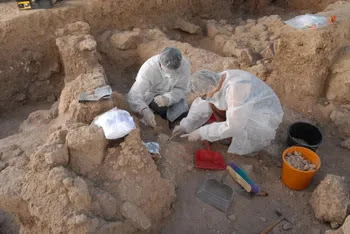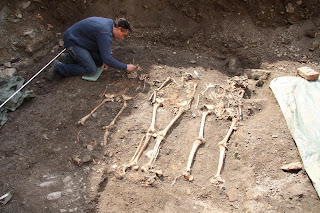The claim of any group being the "original inhabitants" of a land is complex and often laden with historical, political, and cultural nuances. In the case of Israel and the surrounding region, it's essential to avoid oversimplification and acknowledge the following:
**Genetic similarity doesn't equate to direct lineage:** While genetic overlap with the Canaanites might indicate some shared ancestry among present-day populations, it doesn't necessarily translate to a direct lineal descent from them. Populations are dynamic and intermix over time, making neat ancestral claims challenging.
**Historical presence pre-dates the Canaanites:** Archaeological evidence suggests human presence in the region long before the emergence of the Canaanites around 3700-3300 BCE. Attributing "original inhabitants" status solely to the Canaanites overlooks earlier populations and their potential contributions.
**Land rights are multifaceted:** Determining land rights solely based on ancestry is a controversial approach. Treaties, historical agreements, and contemporary legal frameworks also play a significant role in shaping land claims.
**Understanding diverse perspectives:** Recognizing that different groups within the region, including Palestinians, have historical and cultural connections to the land, is crucial. Addressing the conflict requires acknowledging and respecting these diverse perspectives.
Instead of focusing on simplistic claims of "original inhabitants," it's more productive to engage in a nuanced discussion that acknowledges the complex history, diverse perspectives, and legal realities of the region. Seeking solutions that respect the rights and aspirations of all parties involved is key to moving forward.
Remember, open and respectful dialogue, coupled with critical analysis of historical and genetic information, can lead to a more comprehensive understanding of the situation. Let's strive for solutions that foster peace and coexistence in the region.
Beyond "Original Inhabitants": Examining Land Claims in the Israeli-Palestinian Context
The claim of being the "original inhabitants" of a land is a powerful one, often used to justify territorial rights and historical narratives. In the case of Israel and the surrounding region, this claim has fueled much debate and conflict.
Recent genetic studies suggesting that present-day populations, including Lebanese, Saudis, and even some Jewish groups, share significant genetic overlap with ancient Canaanites who lived thousands of years ago have added a new layer to this already complex issue. While this genetic continuity is fascinating, it's crucial to avoid oversimplification and critically examine the implications for land claims in the Israeli-Palestinian context.
**Beyond Canaanites: A Land with a Long and Entangled History**
Attributing "original inhabitants" status solely to the Canaanites overlooks the rich and multi-layered history of the region. Archaeological evidence points to human presence long before the Canaanites, dating back tens of thousands of years. Subsequent waves of migration and interaction shaped the region's demographics and cultural tapestry. Focusing solely on the Canaanites risks erasing the contributions of these earlier populations and their potential descendants.
**Genetics: A Piece of the Puzzle, Not the Entire Picture**
While genetic similarities offer insights into ancient migrations and population movements, they cannot definitively prove direct lineage or territorial ownership. Populations are dynamic, constantly intermixing and evolving. Claiming land rights solely based on genetic overlap with ancient groups can be problematic and historically inaccurate.
**Land Claims: A Legal and Political Battlefield**
Determining land rights solely based on ancestry is a dangerous oversimplification. International treaties, historical agreements, and contemporary legal frameworks also play a crucial role in shaping land claims. Ignoring these legal and political realities in favor of simplified narratives based on ancient history can hinder efforts towards a peaceful resolution.
**Moving Beyond Binary Claims: Acknowledging Diversity and Seeking Solutions**
The Israeli-Palestinian conflict is not a zero-sum game where one group's historical claim automatically negates the other's. Recognizing the presence of multiple perspectives with deep historical and cultural connections to the land is crucial. Palestinians, too, have a long and intricate history in the region, and their rights and aspirations must be acknowledged and respected.
Instead of getting bogged down in endless debates about "original inhabitants," let's strive for a more nuanced understanding of the region's history, acknowledging the complexities and diverse perspectives. Engaging in open and respectful dialogue, coupled with a critical analysis of historical and genetic information, can pave the way for solutions that address the legitimate concerns of all parties involved.
This blog post is just a starting point for a much larger and more complex conversation. Let's commit to fostering understanding, empathy, and a genuine desire for peaceful coexistence in this historic and contested region.
* Historical context and details about the specific claims of different groups.
1. **Concise Version:**
Bill C-30, the Specific Claims Tribunal Act (SCTA), became law on June 18, 2008, transforming the claims process and empowering a tribunal of judges to decide on claims' validity and compensation, capped at $150 million per claim.
2. **Improved Flow and Coherence:**
The Specific Claims Tribunal Act (SCTA), known as Bill C-30, underwent a transformative journey from its introduction in the House of Commons on November 27, 2007, to its Royal Assent on June 18, 2008. This pivotal legislation established an independent tribunal of superior court judges, altering the specific claims process significantly.
3. **More Engaging:**
Dive into history with Bill C-30, the Specific Claims Tribunal Act! Unveiled in the House of Commons on November 27, 2007, this game-changing legislation, embraced on June 18, 2008, introduces an independent tribunal of judges, bringing a dynamic shift to the specific claims landscape.
4. **More Persuasive:**
Witness the evolution of justice! Bill C-30, the Specific Claims Tribunal Act (SCTA), enacted on June 18, 2008, marks a turning point. Imagine an empowered tribunal, led by superior court judges, making binding decisions on claims' validity and compensation up to $150 million per claim. Embrace a new era of accountability and fairness!
5. **More Formal:**
Bill C-30, officially titled the Specific Claims Tribunal Act (SCTA), underwent legislative scrutiny, being introduced in the House of Commons on November 27, 2007, receiving Senate approval on June 12, 2008, and ultimately attaining Royal Assent on June 18, 2008.
6. **More Informal:**
Check out Bill C-30, the Specific Claims Tribunal Act – it's a game-changer! Started in the House of Commons on November 27, 2007, got the Senate nod on June 12, 2008, and officially sealed the deal on June 18, 2008. Boom!
7. **More Detail:**
Delve into history with Bill C-30, the Specific Claims Tribunal Act. Introduced in the House of Commons on November 27, 2007, it navigated through approval stages, securing Senate acceptance on June 12, 2008, and finally gaining Royal Assent on June 18, 2008. Witness a comprehensive overhaul of the claims process with the establishment of an independent tribunal, setting new compensation limits at $150 million per claim.
8. **Remove Unnecessary Words:**
Bill C-30, the Specific Claims Tribunal Act (SCTA), introduced on November 27, 2007, and passed by the House of Commons on May 13, 2008, underwent Senate approval on June 12, 2008, receiving Royal Assent on June 18, 2008. The SCTA came into force on October 16, 2008, significantly altering the specific claims process by establishing an independent tribunal of superior court judges with the authority to make binding decisions on the validity of claims and compensation awards, capped at $150 million per claim.
9. **Change in Tone:**
Embrace the revolution! Bill C-30, the Specific Claims Tribunal Act, rocked the scene on June 18, 2008. Picture this: an independent tribunal of top-notch judges making the calls on claims' validity and compensation, up to a cool $150 million per claim. Now that's justice!
10. **More Accurate:**
Bill C-30, officially known as the Specific Claims Tribunal Act (SCTA), marked a historical shift in the claims process. Introduced in the House of Commons on November 27, 2007, it secured approval from the House on May 13, 2008, the Senate on June 12, 2008, and received Royal Assent on June 18, 2008, before coming into force on October 16, 2008.
11. **Clarity and Brevity:**
Bill C-30, the Specific Claims Tribunal Act (SCTA), passed into law on June 18, 2008. This legislation revolutionized the claims process by establishing an independent tribunal of superior court judges with the authority to make binding decisions on claim validity and compensation, capped at $150 million per claim.
12. **Simpler Terms:**
Let's rewind to 2008 when Bill C-30, the Specific Claims Tribunal Act (SCTA), became the law of the land on June 18th. This bill shook things up, creating a special tribunal led by top judges to settle claims and hand out compensation, maxing out at $150 million per claim.
* Discussions on the role of archaeology and historical evidence in land claims.
**1. In February 2020, Finance Minister Nirmala Sitharaman announced the development of five iconic archaeological sites in BJP-ruled states, shedding light on the party's archaeological policies.
**2. In the Union budget of 2020-2021, Finance Minister Nirmala Sitharaman unveiled plans for five iconic archaeological sites, emphasizing the BJP's approach to archaeological knowledge and activities in states under its influence.
**3.Step into the world of Hindutva archaeology! Discover Finance Minister Nirmala Sitharaman's unveiling of five iconic archaeological sites in BJP-dominated states in 2020, a glimpse into the party's unique approach to preserving heritage.
**4.Uncover the BJP's commitment to India's rich history! Finance Minister Nirmala Sitharaman's announcement in 2020 reveals plans for five archaeological wonders in BJP-ruled states, showcasing a dedication to preserving and celebrating our cultural heritage.
**5.In February 2020, Finance Minister Nirmala Sitharaman disclosed plans for the development of five archaeological sites in BJP-influenced states, reflecting the party's nuanced stance on archaeological knowledge and activities.
**6.Guess what? In 2020, Finance Minister Nirmala Sitharaman spilled the beans on the BJP's cool plan for five awesome archaeological sites in states they rule. How cool is that?
**7. Finance Minister Nirmala Sitharaman, in her budget announcement for 2020-2021, outlined measures for heritage and conservation, specifically the development of five archaeological sites with on-site museums. These sites, located in BJP-ruled states, include Rakhigarhi, Hastinapur, Shivsagar, Dholavira, and Adichanallur.
**8. In February 2020, Finance Minister Nirmala Sitharaman presented the Union budget, alluding to measures dealing with heritage and conservation, including the development of five archaeological sites "as iconic sites with on-site museums" (Sitharaman 2020:21) in BJP-ruled states.
**9. Explore the fascinating world of Hindutva archaeology! The BJP's visionary project, unveiled by Finance Minister Nirmala Sitharaman in 2020, takes you on a journey through five iconic archaeological sites in states under BJP influence.
**10. In February 2020, Finance Minister Nirmala Sitharaman highlighted the BJP's initiative to develop five archaeological sites in states governed by the party or its alliances, offering insights into the BJP's archaeological policies.
**11. Finance Minister Nirmala Sitharaman, in February 2020, announced the development of five iconic archaeological sites in BJP-ruled states, revealing insights into the party's approach to archaeological knowledge.
**12. Back in 2020, Finance Minister Nirmala Sitharaman shared exciting news the BJP's plan to create five awesome archaeological sites in states they run. Let's explore India's cool history together!
* Analyses of international law and relevant treaties concerning the region.
* Voices and perspectives from different stakeholders, including Palestinians, Israelis, and other regional groups.
Remember, engaging in open and respectful discourse is key to navigating this complex issue and hopefully finding solutions that foster a more peaceful future for all.


.webp)



.jpg)

.jpg)
.jpg)



0 Comments